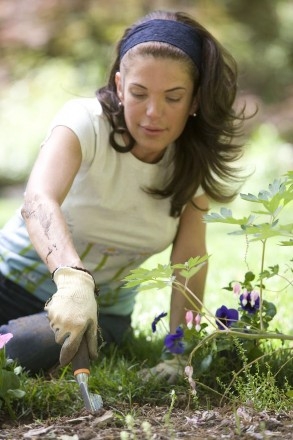Gardening for Health: Benefits for Adults
ID
SPES-389NP
Introduction to Gardening
There are many health benefits from gardening. Whether you choose to plant a small container gardening for herbs or you have a large inground row garden plot, all types of gardening can have a major impact on your health. Gardening can relieve stress, create social connections, increase social-emotional health, and more.
Weed Out Stress
Gardening can help contribute to lower anxiety and depressive symptoms, lower your heart rate and cortisol levels (stress hormone), and increase positive emotions. Gardening has been found to increase levels of serotonin and dopamine – the “feel good” hormones in the brain. If you aren’t currently experiencing stress, you can still benefit mentally as gardening has been found to be restorative to all those who participate.
Put the Community in Garden
Gardening can also help combat loneliness and isolation by creating social connections, which is more important as people age. Older adults are particularly vulnerable to feelings of loneliness and community gardens can create connections with neighbors and increase community spirit. Research shows that gardening can increase self-satisfaction by giving individuals a sense of purpose, and can help form better social networks.
Grow Your Mind
Participating in vegetable gardening for at least twenty minutes helped improve brain nerve growth in individuals of all ages, which can help with memory. Gardening may possibly allow individuals to develop skills that could lead to potential employment opportunities, such as business, landscape, biology, and service. Grow yourself expression and creativity through growing your own garden.

Romaine Healthy and Active
Having your own garden can be a low-cost way of feeding yourself and your family. Growing your own food increases the amount of fruits and vegetables you eat. Pulling, digging, reaching, and twisting as part of gardening is considered light aerobic exercise, which can help improve heart and lung health. Outside gardening in the sunshine has been found to increase Vitamin D levels and Vitamin D helps keep your bones, muscles, and teeth strong. Remember to wear sun protective clothing or apply sunscreen every two hours.
References
Chalmin-Pui, L.S., Griffiths, A., Roe, J., Heaton, T., and Cameron, R. 2021. “Why garden? Attitudes and the perceived health benefits of home gardening.” Cities 112.
De Bell, S., White, M., Griffiths, A., Darlow, A., Taylor, T, Wheeler, B., and Lovell, R. 2020. “Spending time in the garden is positively associated with health and wellbeing: Results from a national survey in England.” Landscape and Urban Planning 200.
Engemann, K., Pedersen, C.B., Arge, L., Tsirogiannis, C., Mortensen, P.B., Svenning, J.C. 2019. “Residential green space in childhood is associated with lower risk of psychiatric disorders from adolescence into adulthood.” Proceedings of the National Academy of Sciences of the United States of America 116, no. 11: 5188-5193.
Park, S. A., Lee, A. Y., Park, H. G., and Lee, W. L.
2019. “Benefits of gardening activities for cognitive function according to measurement of brain nerve growth factor levels.” International journal of environmental research and public health 16, no. 5: 760.
Soga, M., Cox, D.T., Yamaura, Y., Gaston, K.J., Kurisu, K., and Hanaki, K. 2017. “Health benefits of urban allotment gardening: Improved physical and psychological well-being and social integration.” International Journal of Environmental Research and Public Health 14, no. 1.
Thompson, R. 2018. “Gardening for health: A regular dose of gardening.” Clinical Medicine 18, no. 3: 201-205.
Virginia Cooperative Extension materials are available for public use, reprint, or citation without further permission, provided the use includes credit to the author and to Virginia Cooperative Extension, Virginia Tech, and Virginia State University.
Virginia Cooperative Extension is a partnership of Virginia Tech, Virginia State University, the U.S. Department of Agriculture, and local governments. Its programs and employment are open to all, regardless of age, color, disability, sex (including pregnancy), gender, gender identity, gender expression, genetic information, ethnicity or national origin, political affiliation, race, religion, sexual orientation, or military status, or any other basis protected by law.
Publication Date
May 11, 2022



